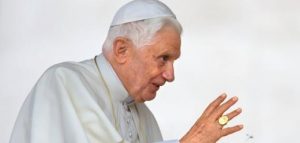
On 28 January 2003 I had a conversation with the latter-day pope who then still was called Kardinal Ratzinger. It was a truly peculiar conversation, focussing on the question as to whether the Catholic Church would support the “money-for-peace” initiative of the United Transnational Republics to buy the war against Iraq from George W. Bush.
For this reason, I had to give him my short elevator pitch about the Transnational Republics: global problems cannot be solved with national structures, but only with transnational structures. And that such a transnational structure would have to follow the rules of subsidiarity – with individuals instead of nations as their smallest entities: “All power originates in the individual and is not alienable.”
While I was explaining all of this to him, I had this perpetual though running through the back of my brain: what the heck am I doing here? Explaining transnational structures to Ratzinger? Dear me! The church already is one of the oldest and most successful transnational structures!
No wonder that Ratzinger gave me quite a strange look. Buying the war! A subsidiary world government! He would give it a consideration, he said. And then he asked his secretary to collect all the further information from me.
Well, the idea of a world government is not ours and certainly not new. Einstein, Keynes, Kant and many, many others have thought and published about it. But still, I was quite delighted when I could read this at spiegel.de:
Benedikt XVI: The necessity of an integral development of the peoples of the world as well as international cooperation require the establishment of a higher-level international structure built in a subsidiary way,in order to govern globalisation.
So much for now. And all my best,
Georg
